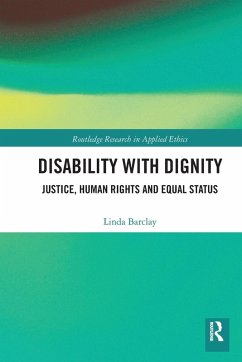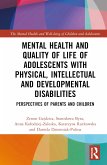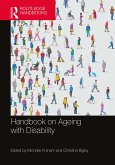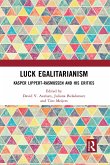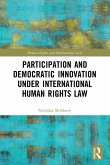Philosophical interest in disability is rapidly expanding. Philosophers are beginning to grasp the complexity of disability-as a category, with respect to well-being and as a marker of identity. However, the philosophical literature on justice and human rights has often been limited in scope and somewhat abstract. Not enough sustained attention has been paid to the concrete claims made by people with disabilities, concerning their human rights, their legal entitlements and their access to important goods, services and resources.
This book discusses how effectively philosophical approaches to distributive justice and human rights can support these concrete claims. It argues that these approaches often fail to lend clear support to common disability demands, revealing both the limitations of existing philosophical theories and the inflated nature of some of these demands. Moving beyond entitlements, the author also develops a unique conception of dignity, which she argues illuminates the specific indignities experienced by people with disabilities in the allocation of goods, in the common experience of discrimination and in a wide range of interpersonal interactions.
Disability with Dignity offers an accessible and extended philosophical discussion of disability, justice and human rights. It provides a comprehensive assessment of the benefits and pitfalls of theories of human rights and justice for advancing justice for the disabled. It brings the moral importance of dignity to the centre, arguing that justice must be pursued in a way that preserves and promotes the dignity of people with disabilities.
This book discusses how effectively philosophical approaches to distributive justice and human rights can support these concrete claims. It argues that these approaches often fail to lend clear support to common disability demands, revealing both the limitations of existing philosophical theories and the inflated nature of some of these demands. Moving beyond entitlements, the author also develops a unique conception of dignity, which she argues illuminates the specific indignities experienced by people with disabilities in the allocation of goods, in the common experience of discrimination and in a wide range of interpersonal interactions.
Disability with Dignity offers an accessible and extended philosophical discussion of disability, justice and human rights. It provides a comprehensive assessment of the benefits and pitfalls of theories of human rights and justice for advancing justice for the disabled. It brings the moral importance of dignity to the centre, arguing that justice must be pursued in a way that preserves and promotes the dignity of people with disabilities.
"This is a splendid book: written in bracing, plain English, it presents a conception of what a just society for people with disabilities might look like . . . The book combines impressive scholarship with a resolutely practical focus on the experience of injustice; it is packed with lucid argument-no trace of obfuscation-and proceeds by way of engagement with philosophy of disability, human rights law and some moral and political philosophy. The scope, acuity and consistently high standard of the arguments make this a work that anyone concerned about the conditions and rights of disabled people can learn a great deal from." - Notre Dame Philosophical Reviews
"This important book represents the best of recent work in disability and philosophy. It is grounded in urgent practical concerns, rigorously argued, and engagingly written. It makes a major contribution to the field with an integrated account of justice for people with disabilities, in which distributive fairness and equal status both play critical roles. In developing this account, Barclay offers a trenchant analysis of dignity as equal status, an analysis she employs to ground important disability rights, and to illuminate the routine social interactions that profoundly affect the status and prospects of people with disabilities. Although the book focuses on disability, its analyses of relational justice and dignity make a significant addition to the broader literature in political and moral philosophy." - David Wasserman, The Department of Bioethics, National Institute of Health
"This important book represents the best of recent work in disability and philosophy. It is grounded in urgent practical concerns, rigorously argued, and engagingly written. It makes a major contribution to the field with an integrated account of justice for people with disabilities, in which distributive fairness and equal status both play critical roles. In developing this account, Barclay offers a trenchant analysis of dignity as equal status, an analysis she employs to ground important disability rights, and to illuminate the routine social interactions that profoundly affect the status and prospects of people with disabilities. Although the book focuses on disability, its analyses of relational justice and dignity make a significant addition to the broader literature in political and moral philosophy." - David Wasserman, The Department of Bioethics, National Institute of Health

